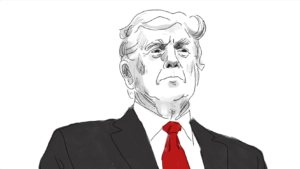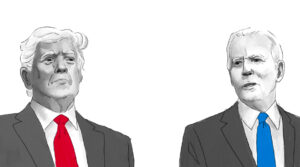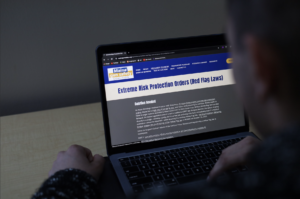The University of Maine’s Vice Presidential debate invited Senator(s) Kyle Ricker and Memphis Peterson, who is running alongside Presidential candidate Keegan Tripp. While Ricker has seniority as the longest-running senator, Peterson has tangible support from Tripp, a prominent UMSG figure. The debate questions will give the student body a better understanding of each candidate’s prowess. Will Ricker take the underdog vote, or will Peterson continue to gauge support with Tripp’s influence?
Which student concern do you feel should be of the highest priority to the executive team? Why is this?
Ricker asserts that the biggest concern for students is academics as a whole. He further states that since students come to university for the end goal of a degree, advocating on behalf of this is most vital. Under his leadership, he would implement a 24/7 study space and further advocate for add/drop dates to serve the student body.
Peterson, however, believes the biggest concern as the executive government has control is to “rebuild itself as a connective tissue.” This means making student government a unified front (frats, honors, students and clubs) to the administration. Being a collective as a campus is what Peterson’s campaign relies on.
What did this year’s executive team do well, and what would you do differently?
Peterson believes that this year has been the best as of yet on account of the fluidity of roles. The Senate worked as a group with limited drama. The problem, as he asserts, is that many members are leaving after the spring semester. This professional, friendly and communicative bunch clearing out will prove to be a test. Peterson feels that the overall connection between executives and senators could have been stronger and thus would like to see barriers broken down as communication is less restricted by normative lengthy bureaucracy.
Ricker states that the work ethic amongst senators has been of great improvement. Instead of one initiative being worked on as a group, multiple have been able to be spearheaded. Ricker thinks that bringing more people into student government and widening understanding about UMaine concerns, in general, would be of influential help to the student body. More consistency and information sharing are most important.
Do you have any concerns about the UMaine System and its decision-making process?
Kyle Ricker believes student voices are needed more. Students in communities “should have a more tangible impact, their voices not only heard but getting acted upon.” Ricker raises concerns about transparency on who is making decisions for the UMaine body and how these decisions are made. He continues to describe how the student-faculty relationship is sensitive. He thinks UMSG should go to faculty, not with arms-swinging, but with cohesive listening and responding.
Peterson talks about how many promises from auxiliary services have been made but not followed up on. Decision–making seems to be isolated from the student government; therefore, there should be a priority change to the student’s quality of life. While UMaine has pushed big projects with upsides, they are dismissive of present student’s needs. Peterson boils this down to how accountability needs to be taken seriously, going against Ricker’s ideas of faculty/student dynamics. He thinks accountability is more important than appeasement, scrutinizing faculty and UMSG.
Do you (Peterson) feel you have the advantage in this election?
Peterson admits that his association with Tripp does give him influence, and he applauds Tripp’s work, which he asserts has greatly benefited thousands of students.
Do you (Ricker) feel you are at a disadvantage?
Ricker reminds us of the 77% participation rate in the last election. He again states the importance of getting students involved in student government and having them more actively involved with group leaders on campus.
However, Peterson refutes that this is a misunderstanding as the UMaine government is not rebuilding but innovating. Student Government has been growing, and Peterson accredited that to his and Tripp’s involvement.
Would you say your opponent is qualified?
Ricker asserts that his opponent is qualified to be vice president as it is a precedent in his work. Peterson says that he and his opponent are the longest–serving senators, maintaining that Ricker is dedicated to being a leader.
Given those qualifications, what makes you a better candidate?
Peterson speaks to his multiple facets, given his record as chairman of many committees. He says he is happy to step back into a moderator role, given he understands the efficiency senators are capable of.
Ricker, too, contends his membership with committees outside of student government. He says that this gives him a much–needed perspective on government policy. He also disagrees with Peterson, saying that the vice presidency is not a management role but an outspoken, active role.
Peterson agrees that not enough people know about student government, and therefore, it is important to go above and beyond when talking to the student body. However, he also stands by his and Tripp’s work, stating that he sees results from their advocacy. While there is more he hopes to do, he is happy with his current progress.
How can students hold you and other UMSG leaders accountable for less favorable decisions made in-office?
Ricker points back to the importance of outreach and students being informed to help address this issue.
Peterson agrees with Ricker’s sentiment that “just because there are more places to go, does not mean there is no progress.” He wants to make decisions to open up healthy discourse amongst the student body.
What can make the Senate a more inclusive environment?
Peterson talks about outreach to other colleges at UMaine to get unique perspectives.
Ricker agrees with Peterson, giving precedent to having more widespread student understanding because UMSG could be missing out on possible amazing leaders.
For Ricker: What would your potential partnership with President Tripp look like?
Ricker asserts he would have a great working relationship as they have similar ideas about what would be best for student government.
For Peterson: What would your potential future working relationship with Ricker look like?
Peterson applauds his past and current relationship with Ricker, saying they “agree on the vision and are not afraid to disagree on how to get there.” Furthermore, he states that if they do not argue, they may miss potential ideas and improvements.
How will you bridge the gap between the student body and the administration?
Peterson wants to prevent the administration from filtering information through the UMSG and have them talk directly to the student body instead.
Ricker again states the importance of reaching out and providing dialogue as a mediator between student organizations.
Why are you a better choice than the opposing candidate?
Ricker again talks about how he has been very involved on campus from many perspectives outside student government. He understands what it is like being another student trying to talk with the student government as opposed to Peterson’s more internal experience.
Peterson says that he has the best understanding of what student government is. “Not trying to put out small fires but find the source and put them out,” is what he stands by. He is not afraid to speak up when something is wrong. Peterson argues that Ricker cannot keep up with his promises.













